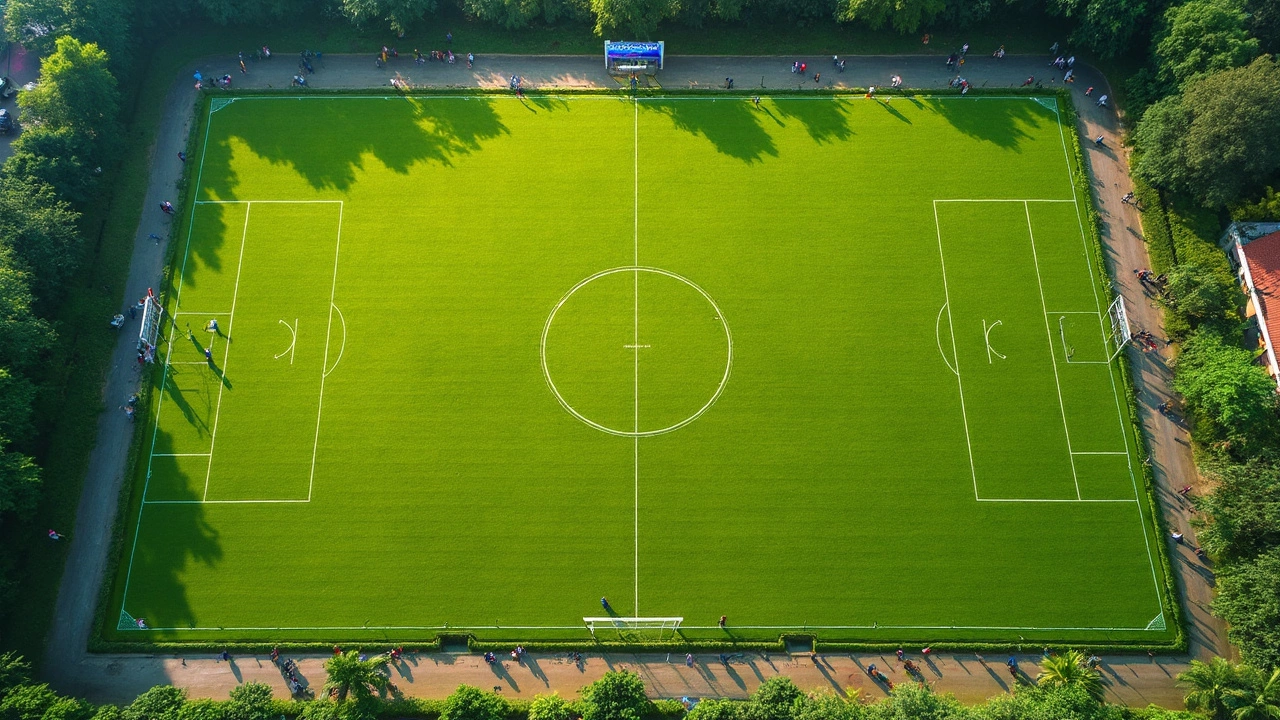If you’re checking out land for sale, it’s easy to get lost in numbers—1 acre, 2 acres, half an acre. But what does that even look like in real life? A common trick is to compare it to something you can actually picture, like a football field. Most folks know what one looks like, which is why this is the go-to comparison when someone asks about land size.
Now, I’ve kicked a few footballs myself, but when people throw around terms like “acre,” it can still feel a bit slippery. You want to know if a listing has enough room for a decent backyard or if it’s “big enough for a football game.” Numbers alone don’t cut it—you need a visual anchor. So, let’s break down what 1 acre really means by lining it up against a football field, down to the nitty gritty.
- Size of an Acre in Simple Terms
- How Big Is a Football Field?
- Acre vs Football Field: Side-by-Side
- Why This Comparison Matters When Buying Land
- Other Fun Size Comparisons for 1 Acre
Size of an Acre in Simple Terms
People toss around the word "acre" like everyone just knows what it means, but it’s not something you run into every day unless you’re hunting for land. So, here’s the straight answer: 1 acre is exactly 43,560 square feet. That’s it. No guessing, no rounding up. If you want it in meters, it’s about 4,047 square meters.
If you try to picture it, 1 acre can be a square, a long rectangle, or even a weird L-shape if a property line winds around a creek. The shape doesn’t matter. It's the total space that counts. The classic way to visualize is a square that's about 208.7 feet on each side.
| Unit | Measurement for 1 Acre |
|---|---|
| Square Feet | 43,560 |
| Square Yards | 4,840 |
| Square Meters | 4,047 |
| Square Miles | 0.00156 |
| Hectares | 0.4047 |
Still feels a little abstract? Here are a few things that equal about 1 acre:
- About 16 tennis courts if you put them side-by-side
- Roughly 70 average-sized parking spaces (not stacked, just side-by-side with driving aisles)
- A little less than one standard American football field, not counting the end zones
Don’t fall for the idea that acres are only country talk, either. Even city lots use this standard if they're large enough. When you’re looking at land for sale, knowing this number helps you spot which listings are oversized and which are actually pretty tight.
How Big Is a Football Field?
So, let’s talk specifics. When people picture a football field, most are thinking about what they see on TV—American football, the NFL kind. For those fields, the numbers are pretty straightforward. The total length from end to end, including the end zones, is 360 feet. The standard width across is 160 feet. That gives you a big, rectangle of well-kept grass (or turf) to measure against.
If you want it in yards—which is actually how football folks measure things—that’s 120 yards long and about 53.3 yards wide. The playing area alone (not counting the areas for spectators or benches) sums up to 57,600 square feet. Here’s a quick snapshot to make sense of it all:
| Field Dimension | Metric | Imperial |
|---|---|---|
| Length (end zone to end zone) | 109.7 meters | 360 feet (120 yards) |
| Width | 48.8 meters | 160 feet (53.3 yards) |
| Total Playing Area | 5,351 m² | 57,600 sq ft |
The National Football League puts it like this:
“A regulation football field is 120 yards in length and 53.3 yards in width, including the end zones. From goal line to goal line, it’s 100 yards.”
—NFL Rulebook
People sometimes mix up soccer fields with American football fields, so just to clear things up: soccer fields can be a bit longer and wider, but for the classic football field comparison, it’s always the 120-yard length (including end zones) that counts in these size debates.

Acre vs Football Field: Side-by-Side
Alright, time for the nitty gritty. When you ask, “How many football fields is 1 acre?” the answer actually depends a bit on which football field you mean. In the U.S., most people think of an American football field, not soccer. Let’s stick with that. A standard American football field, not counting the end zones, is 300 feet long and 160 feet wide.
Now, 1 acre is exactly 43,560 square feet. So how do these compare? Here’s some straight-up math:
| Type | Length (feet) | Width (feet) | Area (sq ft) |
|---|---|---|---|
| 1 Acre | n/a | n/a | 43,560 |
| Football Field (no end zones) | 300 | 160 | 48,000 |
| Football Field (with end zones) | 360 | 160 | 57,600 |
So, a full football field with end zones (360 ft x 160 ft) actually covers more area than 1 acre. But it’s close! If you just look at the playing field (300 x 160), that’s about 1.1 acres. To put it another way, 1 acre is about 91% the size of a football field without the end zones. If you chopped off about 9% of that field, you’ve got an acre.
Here’s a quick cheat sheet if you want to eyeball this outside:
- 1 acre is just a bit smaller than a full American football field—not counting the end zones.
- Add the end zones, and a football field is 33% larger than an acre.
- A soccer field varies in size but most are bigger than a single acre, often closer to 1.7 acres.
So if you’re walking a vacant plot and trying to picture real size, imagine standing at one corner of a football field. Walk the length and almost the full width, and you’ll have a solid idea of what 1 acre actually looks like in the real world.
Why This Comparison Matters When Buying Land
So, why does everyone keep talking about football fields when sizing up land? It's simple: most people can picture the length and width of a football field way better than some random number of square feet. This is especially important if you’re shopping for land for sale and you want to avoid feeling totally lost during site visits and contract talks.
Let’s get practical. In the U.S., a standard football field (including the end zones) measures 360 feet long by 160 feet wide, making it about 1.32 acres. But a lot of people still use this mental shortcut: “1 acre is about three-quarters of a football field.” That’s close enough to give you a strong visual, especially when comparing properties that might list a size in acres or fractions.
Land agents and buyers use this trick for several reasons:
- Instant visualization: If you stand in an empty lot, it’s tough to sense the space unless you relate it to something you know, like a football field.
- Avoiding confusion: Numbers like 43,560 square feet (1 acre) don’t register until you compare them to something real-world.
- Planning layouts: Wondering if your dream house, a shed, and a garden will fit? Picture cutting a football field into chunks to see what you can squeeze in.
Check out how an acre stacks up to a football field here:
| Measurement | 1 Acre | Football Field |
|---|---|---|
| Square feet | 43,560 | 57,600 |
| Length (ft) | ~209 | 360 |
| Width (ft) | ~209 | 160 |
| Approximate Acreage | 1 | 1.32 |
Even some seasoned buyers have gotten mixed up by confusing a hectare (which is 2.47 acres) with an acre, or thinking a football field is exactly 1 acre. The numbers matter, especially when that impacts your budget or the project you’re planning.
So, next time you’re at a showing or scrolling through listings, picture that field under the Friday night lights. It makes checking out land a whole lot easier and stops you from over- or underestimating what you’re actually getting.

Other Fun Size Comparisons for 1 Acre
If you're still scratching your head about how big one acre is, you're definitely not alone. Everyone's got their go-to comparison, whether they're talking to a real estate agent or figuring out if the family barbecue will fit in the backyard. Here are some easy and fun ways to picture 1 acre besides the classic football field example.
- Parking Spaces: 1 acre can fit about 150 standard parking spots, the kind you see at most grocery stores. So, if you stare at a typical big box store parking lot, that’s roughly the area you’re working with.
- Basketball Courts: An NBA regulation court is about 4,700 square feet. You could squeeze just over 9 full-sized basketball courts into an acre.
- Tennis Courts: A standard doubles tennis court is approximately 2,808 square feet. You’ll get just under 16 tennis courts on 1 acre if you line them up side by side.
- Baseball Diamonds: A Little League baseball diamond, including outfield grass, usually takes about 1.2 acres. Your 1-acre lot is almost enough for one, but not quite the whole thing.
- Homes: For a different angle, the average new single-family home in the US (not counting the yard) is around 2,300 square feet. So one acre could fit about 18 average-sized homes, with no space in between.
| Comparison | Area per Unit (sq. ft.) | Number per Acre |
|---|---|---|
| Standard Parking Spot | 290 | ~150 |
| NBA Basketball Court | 4,700 | ~9 |
| Tennis Court | 2,808 | ~15.5 |
| Average US Home | 2,300 | ~18 |
| Little League Field | 52,272 | ~0.8 |
So, next time you spot a listing for 1 acre of land, just think—"could I fit a small parking lot, a row of basketball courts, or a neighborhood’s worth of houses here?" It’s a lot easier to judge the space this way than just staring at square feet on a page. And if you walk past sixteen tennis courts all lined up, that’s your acre in real life.
